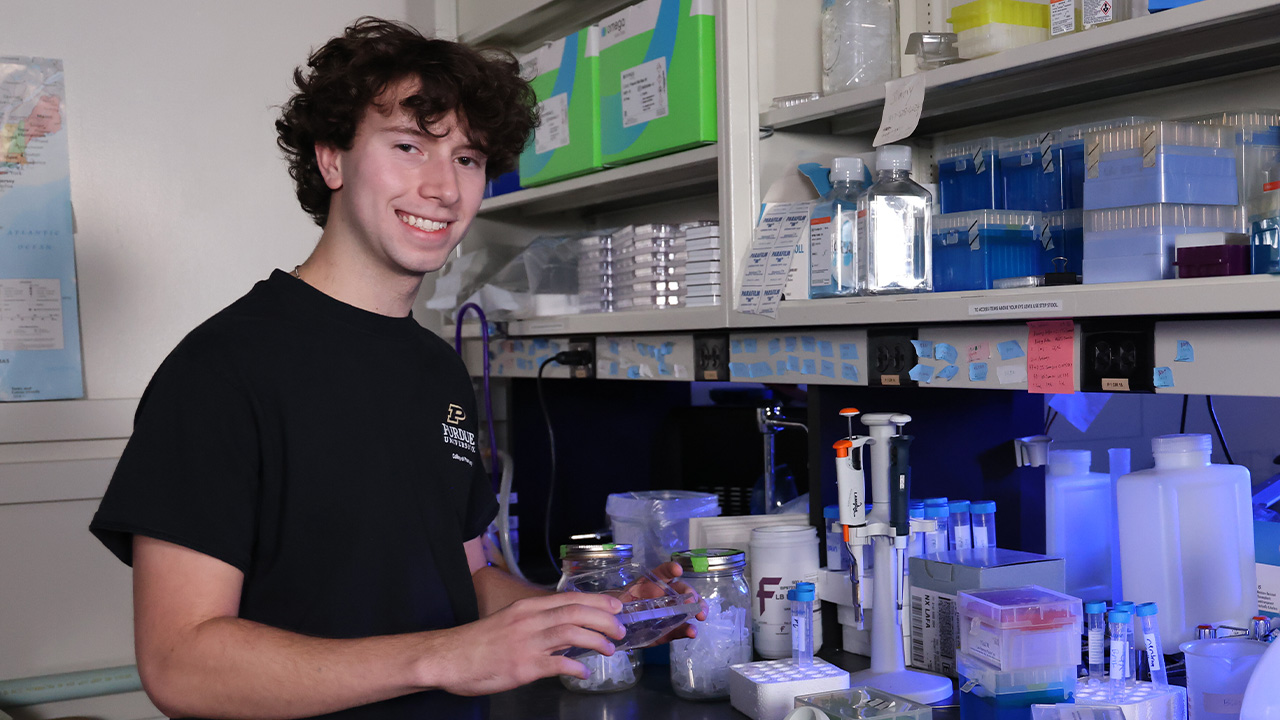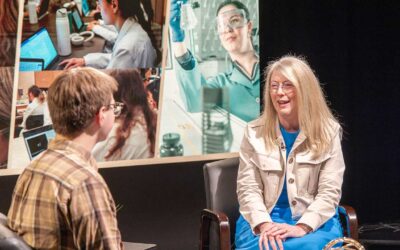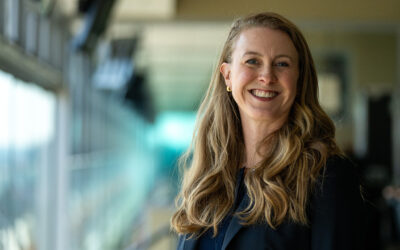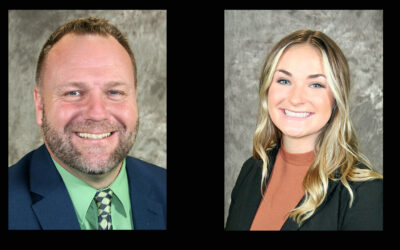Season 1, Episode 5
Sam King knew he wanted to study pharmacy—that was a given. What he didn’t know was the way the Purdue University College of Pharmacy would ignite his passion for research and shape his future plans.
Instead of taking the PharmD route, Sam decided to pursue a pharmaceutical sciences degree – a degree that prepares students to work in research environments within the areas of drug discovery, development, and commercialization.
Sam has taken advantage of a plethora of opportunities to advance his skills through research-based summer internships across the country and has been recognized by the National Institutes of Health for his work—a rare feat for an undergraduate. In this episode, he highlights his experiences and the ways Purdue Pharmacy is helping him prepare for his next giant leap.
Tune in to hear how Sam King is Living the Pharm Life.
Read Transcript
>> I’m excited to be here today with Sam King, a senior majoring in pharmaceutical sciences at the Purdue College of Pharmacy. Sam, thanks for being here today.
>> Thanks for having me, thanks for coming to visit the lab.
>> Yeah, of course, I’m so excited to be here.
To get us started, could you tell us a little bit about where it is we’re sitting right now?
>> Yeah, so we’re in the lab that I’ve been a part of for the last two years. It’s in Dr. Emily Dyken’s labs, which is one of our organic chemistry professors when we both took organic chemistry.
And I really found the lab because going into college, I was really interested in research, and I was trying to figure out how to get involved. And I know how important, from my past research experience in high school and from what I’ve heard from other people, how important it is to have a good mentor.
And I really liked her style of teaching, and I also just really like what the lab studies. So the stuff that I do and the research that I do in this lab is related to epigenetics and cancer progression and kind of a little bit of development. And the projects I’ve been working on is how do we create drugs and small molecules and peptides to target kind of these epigenetic proteins.
So I really like the subject matter and just being in the lab.
>> Yeah, I definitely wanna hear more about your research experience, but first, could you tell us a bit more about yourself?
>> Yeah, so I grew up in Austin, Texas, well, before that New Jersey, but mostly Austin, Texas.
And I came into college really thinking I wanted to go to pharmacy school. I did a little bit of pharmacy tech experience at Walgreens, I don’t know.
>> I did work at Walgreens.
>> Walgreens as well, yeah.
>> Yeah.
>> Yeah, I feel like that’s super common with people interested in pharmacy, but I really liked it.
And then once I started doing research, I kind of realized that maybe I still like the drug part and I still like the pharmacology, but I like a little bit more of the science side of the field.
>> Yeah, that’s fantastic. So now back to your research, can you describe the things you do on a day to day basis?
>> Yeah, so the funny way I like to tell people what I do in the lab is just like moving liquids in one container to another, because really most of it’s just moving stuff from one thing to another. It’s all clear, and really the exciting part is just knowing what’s happening and trying to figure out what’s happening.
So one of the more exciting projects I get to work on this lab is taking cancer cells that have been isolated from patients and then just testing drugs against them and see if they work. And then on the other side of that, doing more things with individual proteins and enzymes and figuring out more, even on the more molecular level, how things work.
Yeah, most of it’s moving liquids around, and really, the exciting part is just getting to plan things and getting results, especially successful results and positive results.
>> Yeah, that’s incredible, I think it’s so cool. I get really excited about this stuff. I don’t work in a bench based science lab, but I think it’s so cool.
So I think it’s great that you’re doing this. Now you’ve also done a lot of summer internships. Could you walk us through what those experiences were like?
>> Yeah, so my first one was back home in Austin, and it was with this small startup company called Babson Diagnostics.
And what they were trying to do is instead of needing blood from your vein to get clinical lab results, like blood count, stuff like that, they were trying to use finger samples at much smaller quantity and needing much smaller quantities of blood. So I spent the summer just kind of taking blood from people, and I was really hired because I had been a pharmacy tech.
It was kinda one of the unexpected things that came out of being a pharmacy tech at Walgreens. And the reason was they were trying to create a technology to be used by anyone. Anyone could use this to draw their blood. But really for commercialization, have this be a service provided at pharmacies.
And so I got to be involved with a little more of how do we implement into a pharmacy’s workflow, how this stuff works. And then I got kind of a different experience where I was doing research into regulations about who can draw blood in different states. And how do you order these lab tests?
Can a pharmacist order them? There are some states where you can just walk up and just get blood tested if you want to. There’s other states where you need a doctor, so kinda figuring that out. And so that was a really fun experience. And then my summer after that, I did more similar to what I do here, where it was more of a
bench work style lab internship.
And so I worked in this lab that studied the DNA damage response. So, again, kind of in cancer, and I worked with this molecule. That was kind of neat because it’s been in clinic for the past 30, yeah, actually 50 years now, used in patients. And some people in the early 2000s, kinda said that this drug, in addition to doing what it’s doing, might cause DNA damage.
And so kinda my project that summer was figuring out, does a drug cause DNA damage? And if so, how? What’s the mechanism? What protein does it interact with? And I also got to see a little bit more of the clinical side of things. Mayo clinic is really integrative in terms of what they do at the bench versus what they do in clinics.
They really have programs, so that if there’s a patient getting their tumor out and you wanna do something with that tumor, they’re like, go for it. We’ll provide you all the resources. And then my most recent internship was at the National Institutes of Health, and I was in a neuropharmacology lab.
And I actually got that research internship because the person I worked for came, I don’t know if it was during pathophysiology Dr. Watson you’ve heard of him?
>> Yes.
>> Did you go to that or do you just remember?
>> I think I went to that.
>> Really, Dr. Sibley?
>> Yes, I did go to that.
>> Yeah, so I actually met him, I saw his work there. I thought it was really cool just because he did a lot of, how did the classic g protein coupled receptor work, but also just more of with the monkey brains and all that stuff.
So I really liked his stuff, so I followed up with him, and I ended up working for him that summer. And the NIH is pretty cool because it also is very clinical facing. So there’d be all of these really famous speakers that would come in, one time we had one of the most recent Nobel Prize winners come speak.
Or there was just a lot of people with really neat research that came, and all of these kinda expanded what I was doing here at Purdue in terms of lab, let me apply what I learned in my classes. And they’ve all really opened up, each one successively, have opened up doors for me for the future.
>> Yeah, that’s really great. I know a lot of people have had difficulties getting internships, so it’s really great to hear about all the amazing things that you’ve been able to do and how Purdue has been able to help you reach those goals. So what have been your favorite parts of these experiences, and how do you hope to use them in your future career?
>> I think, so the part I’ve enjoyed most is about getting to know the different ways that these different institutions kind of look at diseases and processes and even how they just approach science. The way that I think that people at Mayo Clinic view disease and how they approach tackling cancer differs a lot from how we do know as a more basic science center, and also just how the NIH does it.
And a lot of it has to do with just the different resources they have available. So Mayo, they have a good amount of money, and they also have a lot of really close integration between just a wide variety of patients and their science, whereas the NIH also is kinda the same way.
And I think just having different perspectives about how people approach problems has made me have a more well rounded on how I think of diseases, which is super helpful. As someone that wants to go into science, I think having that diverse set of philosophies is really gonna help me going forward.
>> Yeah, yeah, that’s so true, because I know even just going to different, cuz I’ve worked at Walgreens like you have.
>> I did a rotation at CVS, and just seeing the differences there is crazy. So I can’t imagine going to all of these different places and seeing how they look at all of these different things.
I just think that’s amazing.
>> Yeah, even, I think it also helps you realize what in processes is really important versus what is not. If I do something in this lab and then learning how to do it from people in these other labs, they all have slightly different ways of doing it.
And you kind of figure out what is actually necessary, the necessary steps in the process versus what is in science. I think it’s funny, there’s a lot of superstition, right? There’s a lot of things that we think we need to do this. And it’s mostly just you’re just like, okay, it works, so don’t touch it.
And so kinda learning what those things are has been really helpful, even just from figuring out how to do experiments.
>> Yeah, speaking of superstition, I do have to ask you a question. Are you superstitious of the Bell tower? Would you walk-
>> Under it?
>> I haven’t, and I’m not planning on it.
>> I don’t know, have you?
>> Absolutely not.
>> Yeah.
>> Never.
>> I have some friends that have, but I don’t know.
>> I know, I have a friend who scoffs at the superstitions, and she walked right under it. And it’s still remaining to be seen. But it is one of my great concerns on this campus.
>> Yeah, I think one, there was a company that came to visit and to keep students, I think, from having their food and stuff, they put this. I don’t know if you saw, they put this stuff under the bell’s house.
>> They had the table set up right underneath.
And I looked at and I was like, well, that’s weird.
>> Yeah didn’t want anyone having access to it, I guess.
>> Yes, I did see that. All right, but so then, still, speaking of Purdue, how do you feel like Purdue and your degree program, the BSPS degree, has set you up for success in your different adventures?
>> One of the things I’ve noticed so far in kind of these different internships is I interact with a lot of people that go to a wide range of schools, whether it be one of my labmates this summer was just, she was from Yale. At Mayo, there were a lot of students from John Hopkins.
And I really think that the education we get at Purdue through coursework is really just at the same level as all of these other places that some people might think of as being a little more prestigious. But I really think that Purdue really does a great job of just providing that basic knowledge through coursework that really rivals a lot of other really great programs.
And then I also, and then just being from Purdue has also definitely opened up doors, especially that internship that I had because he came and spoke to us. That was a lot of, because of the opportunities that Purdue provided or even just at Mayo. There were also a lot of people who just knew of Purdue and knew of Purdue’s reputation and how successful and hardworking Purdue students are.
And so just having that kind of background, I think has really helped me so far. And going into next steps as well, I really think that having a Purdue education helps set me apart from other people. Yeah, so what are next steps for you? So right now I’m hoping and applying for physician scientist training programs or MDPHD programs.
So it’s kinda this combined degree where you both get to be a physician eventually, and also you’re getting a degree to do basic science research as well. Which kind of differs from, cuz I’m sure a lot of pharm Ds also do research and MDs do research, but it tends to be a little more clinical.
Whereas with the PhD, and we have a pharm DPhD in this lab too, which is pretty cool. You get to really work at things at the molecular level and you’re still moving liquids around and learn how to do that well. And so, yeah, the goal is to be able to see patients kinda get a better understanding of what problems face patients from the clinical side.
Cuz I think there’s a big disconnect between what basic science researcher thinks the best problems are and what problems we should tackle to fight cancer versus what an oncologist thinks are the big problems. And so the idea is to kind of have both sets of training and be able to combine those things to do science that’s a little bit more.
Have a closer space to patients and have a good chance of making a difference in patient care in the near future.
>> Yeah, is there an area you’re thinking of specializing in?
>> I think oncology. I think I really like cancer research, and I think I also shadowed oncologists and things like that, and I think what they do is really important, and I really just enjoy kind of the disease area as well.
So I think that’s kind of the area where I’m thinking of, but I’m sure it’ll change within, cuz the program’s like eight years long, so I’m sure it’ll change within the next eight years.
>> Yeah, I mean, you have plenty of time.
>> Yeah.
>> I mean, I know, personally, I couldn’t have predicted where I’d be in the last four years of my degree, so I can’t even imagine double that time.
>> Yeah, and I’m sure you’re probably like, yeah, I wanna go into this area of pharmacy. Are you still interested in the same area that you started in, or has it kinda shifted?
>> It’s been kind of the same, but also it’s shifted.
>> Cuz I had applied to Purdue because I knew we had a nuclear pharmacy program, and I was like, this is neat.
So then I came to Purdue for that, and I am still interested in doing that. But during the last couple of years, I’ve realized there’s so many other things, too that I wanna try everything now.
>> Yeah.
>> So it’s one of those where I was pigeonholing myself, and now I wanna just see what else is out there too.
>> Yeah, I think there’s a lot of cool things that I think as I start going to these interviews and learning about other schools, there’s a lot of things that Purdue is really good at and specializes in. And you don’t really realize until you see what these other places have to offer, how good it is to be at a place that specializes in some of these things.
Chemistry is a big thing here, and I’ve really enjoyed that, and I know that I probably won’t be able to. Wherever I go next, I probably won’t have the same level of resources and faculty members who are quite as good as they are here.
>> Yeah, so speaking of that, undergraduate research has been such an important part of your time here at Purdue.
What advice would you have for students who are looking into getting into that and kind of stepping outside of their comfort zone.
>> Yeah, I think the biggest thing is just to ask a lot of people. When I was applying for undergrad research positions, there were a lot of labs that I applied to, and they were like, no, I don’t really want you.
And there’s also just lots of times where you’re going to fail a lot when you do things. And I think that’s one of the good things that research teach you. When you try a lot of things, you’re going to also fail at a lot of things. And so I think the biggest advice is just to kinda keep that in mind, know that failing isn’t a reflection on you.
It’s just part of the process, and just go out and try as many new things as possible. Yeah, I think undergrad research isn’t something that I initially thought would be what I really was passionate about and that I wanted to go in a career of research. And I think just trying lots of new things and taking advantage of those opportunities is the best way to figure out exactly what you wanna do.
>> Yeah, that’s great, thank you so much for sharing that. All right, so before we close each episode, I always like to ask one fun question. So my question to you is, what is your ideal vacation destination?
>> So my ideal destination is kind of a little bit science and nerdy based.
It’s the Galapagos Islands, which is where Darwin went and figured out where evolution was. But I’ve heard there’s just a lot of lots of cool tortoises and lots of cool birds, and I’ve always just wanted to go. I’ve heard it’s really hard because it’s a really small island, so it’s like a crazy long plane ride.
But if I could go anywhere, that’s definitely where I wanna go. And I think Purdue actually has a study abroad program that lets you go there for a week, which is definitely something I should have taken advantage of.
>> Hopefully I will get to do it before I graduate, but, yeah, that would be my favorite place.
>> All right, fantastic. Well, Sam, thank you so much for being here today and sharing your story. I think all of our audience members will really appreciate that.
>> Yeah, thank you for coming in. Yep, happy to help.
>> Yeah.




